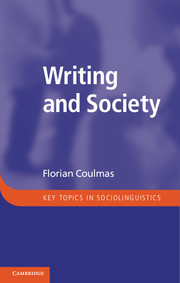Book contents
- Frontmatter
- Contents
- List of illustrations
- List of tables
- Preface
- Acknowledgements
- 1 The tyranny of writing and the dominance of vernacular speech
- 2 The past in the present and the seeds of the public sphere
- 3 Written and unwritten language
- 4 Literacy and inequality
- 5 The society of letters
- 6 Writing reform
- 7 Writing and literacy in the digitalized world
- Notes
- Bibliography
- Index
6 - Writing reform
Published online by Cambridge University Press: 05 February 2013
- Frontmatter
- Contents
- List of illustrations
- List of tables
- Preface
- Acknowledgements
- 1 The tyranny of writing and the dominance of vernacular speech
- 2 The past in the present and the seeds of the public sphere
- 3 Written and unwritten language
- 4 Literacy and inequality
- 5 The society of letters
- 6 Writing reform
- 7 Writing and literacy in the digitalized world
- Notes
- Bibliography
- Index
Summary
To reform means to shatter one form and to create another, but the two sides of this act are not always equally intended nor equally successful.
(George Santayana)Writing as a public good
In the foregoing chapters it has become clear that writing is an indispensable form of communication in contemporary society, embedded in various institutions and replete with social meaning. We have also seen that certain officials act as mediators between the institutions they represent and the general public, driven, partly at least, by self-interest. Command of the written language, rather than being a mere technical skill, has always been and continues to be a marker of social distinction. Written language is an attribute of power, writing potentially a means of empowerment. Whose language functions as national language, official language, recognized minority language, etc., are political questions that require speech communities to make choices. ‘National’, ‘official’, ‘recognized minority’, etc., are modern categories that did not exist in earlier times when writing was less regulated than it became, first in the nation state and even more so in industrial society. Until the advent of general education, writing was for specialists, on the one hand, and, on the other, a private matter that allowed for much arbitrary variation. In Renaissance England, for example, English spelling ‘was nothing short of chaotic’ (Marshall 2011: 115), and much the same can be said of other countries and languages. Even at the threshold of modernity, Goethe still spelt the same words in various ways (Goethe-Wörterbuch n.d.), and no one would have thought less of him for that. The industrial age, however, brought demands for stricter regimentation, conformity and standardization, turning the written language into a public good, that is, a means of communication that came to be recognized as a prerequisite for success in collective endeavours, notably endeavours of the nation state.
- Type
- Chapter
- Information
- Writing and SocietyAn Introduction, pp. 104 - 125Publisher: Cambridge University PressPrint publication year: 2013



